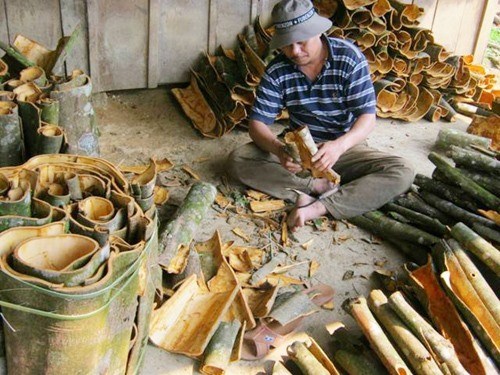Cinnamon trees have long been associated with the spiritual life, economy and culture of Tra My ethnic groups. Since the 1980s and 1990s, cinnamon, especially Tra My cinnamon, has been a major money-maker.
Cinnamon products have been widely consumed in both domestic and export markets, creating a major source of income for people in cinnamon-growing areas. Cinnamon trees have become the most important tree in the economic development of Quang Nam’s Tra My district.
    |
 |
|
Since the 1980s and 1990s, cinnamon, especially Tra My cinnamon, has been a major money-maker. Photo: baoquangnam.vn |
According to Vice Chairman of the Nam Tra My district People’s Committee Tran Van Man, in order to preserve the tradition of growing cinnamon, the district has included the goal of developing cinnamon in its regular resolutions of tasks.
The People’s Council of Quang Nam province also issued a resolution on the conservation and development of Tra My cinnamon. In October 2011, the National Office of Intellectual Property of Vietnam certified the unique quality of Tra My cinnamon.
In Nam Tra My district, 10 of 10 communes plant cinnamon; therefore, the output and cinnamon area has increased continuously over the years. Currently, cinnamon-growing area is 2,864ha and cinnamon output in 2017 reached about 350 tons, an increase of 200 tons compared to 2011.
In recent years, the cinnamon market received renewed attention in the province as demand across the country rises. The price of cinnamon products has gradually improved, so that cinnamon growers can live by planting this type of tree.
However, the current limitation is that the marketing of cinnamon in Nam Tra My district is poor. Almost no purchasing and processing units have signed contracts with farmers; hence, farmers only sell raw products with unstable prices, Man said.
Phan Quoc Cuong, Chairman of the Tra Leng commune People’s Committee in Nam Tra My district, said cinnamon growers want to have stable buyers and new technology to upgrade the value of their products. In addition, there should be a more stable mechanism of co-operation between enterprises and people to collect and buy products from cinnamon, such as branches, leaves and wood, Cuong suggested.
Reggie Turner, an Australian businessman specializing in distributing and selling cinnamon products, said his customers in Australia and the United States are very satisfied with the quality of Tra My cinnamon compared with other cinnamon products such as Sri Lankan cinnamon.
Tra My cinnamon can and should be recognized throughout the world as high quality cinnamon, which can yield high quality health care products, he said.
However, that requires boosting cinnamon quality and investing in new cinnamon plants. But farmers cannot afford this cost, so a cooperative model is needed to bring together farmers, scientists, governments, producers, distributors and sellers.
According to Turner, the demand for medical and herbal health products is increasing worldwide and the world is relying on Vietnam to meet this demand. He believes that Vietnam can build a global brand for Tra My cinnamon. This brand will add value to cinnamon products grown and produced in Vietnam, as well as bring more revenue to farmers.
Nguyen Xuan Son, Director of the Huong Que Production-Processing-Import Export Trading Company Limited, suggested that Tra My cinnamon growers must choose practices to grow, harvest and preserve cinnamon in accordance with international organic standards to meet the strict demands of the world market.
In the future, he recommends piloting a cinnamon cultivating area in Tra Leng commune according to organic standards. This model could be scaled up to raise the value of Tra My cinnamon brand.
At the same time, authorities should give advice and guidance for local people on exploitation and preservation after harvesting in order to preserve the quality of cinnamon to increase trade value as well as processing high value products, Son said.
Source: VNA